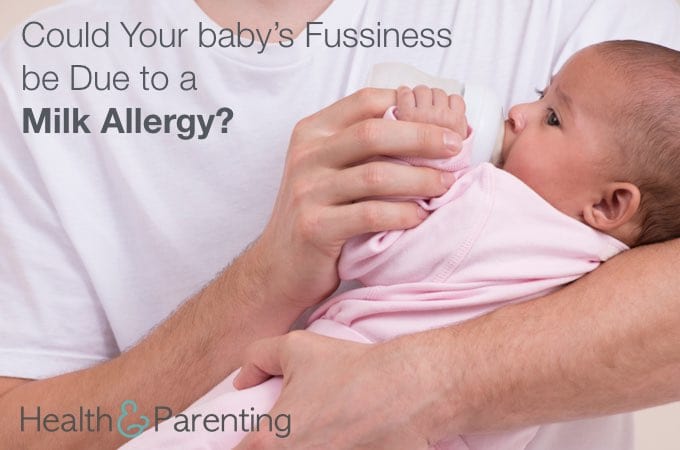Whether your baby is breastfed or formula fed, milk is usually her only source of nutrition for the first four to six months of her life. Even after you start solids, milk continues to be important for your baby. But could your baby’s fussiness and splitting up after eating be due to a milk allergy?
It’s helpful to understand that a milk allergy and milk intolerance are not the same thing, although symptoms can be similar. If your baby is allergic to milk, his immune system reacts to the protein in the milk as if it were harmful even though it’s not. After feedings, allergy symptoms develop, such as hives, a rash, spitting up and possibly watery eyes. Addition symptoms, such as frequent, watery poops may also occur.
You might also notice your baby is fussy and crying immediately after nursing or taking a bottle. A severe allergic reaction, such as trouble breathing is rare but is an emergency and requires immediate medical attention.
If you’re breastfeeding, your baby is not allergic to your breastmilk. Instead, it could be the dairy you are eating that is causing the problem. If your baby is formula-fed, the proteins in the formula may be bothering her.
Milk intolerance is a bit different and does not occur due to a reaction in the immune system. Babies with milk intolerance have problems properly digesting the sugar in the milk. Milk intolerance is also called lactose intolerance because it is the lactose sugar in the milk that’s causing the problem. Symptoms of milk intolerance may include gas, a bloated tummy, diarrhea, spitting up and other colic symptoms, such as fussiness.
If your baby is not gaining weight or has symptoms of milk intolerance or a milk allergy, it’s important to see your pediatrician right away. Your baby’s doctor will likely do an exam and may perform a heel-prick to get a blood sample. The sample will be tested to check for signs of an allergic reaction in the body.
The good news is, milk allergies are pretty uncommon. Experts estimate only about three percent of babies are allergic to milk. Milk intolerance is also rare in babies. When it does develop, it usually occurs a little later in life when kids are in grade school.
If your pediatrician suspects your baby has either milk intolerance or a milk allergy, you may be asked to make a few changes. For example, if you are formula feeding, your baby’s doctor may recommend switching to a hydrolysate formula. If you are breastfeeding, your pediatrician may suggest limiting your dairy intake. If you do need to ditch dairy products, make sure you continue to get enough calcium in your diet. Good sources of calcium without milk include broccoli, kale, figs, white beans and almonds.
Written by Mary Ann DePietro @ writerlady34
This information is not intended to replace the advice of a trained medical doctor. Health & Parenting Ltd disclaims any liability for the decisions you make based on this information, which is provided to you on a general information basis only and not as a substitute for personalized medical advice. All contents copyright © Health & Parenting Ltd 2016. All rights reserved.










